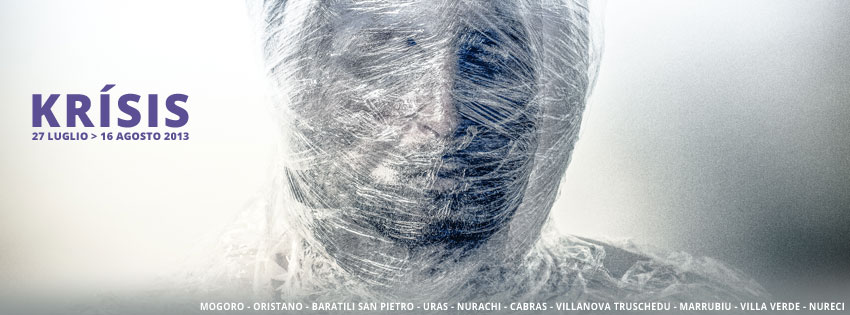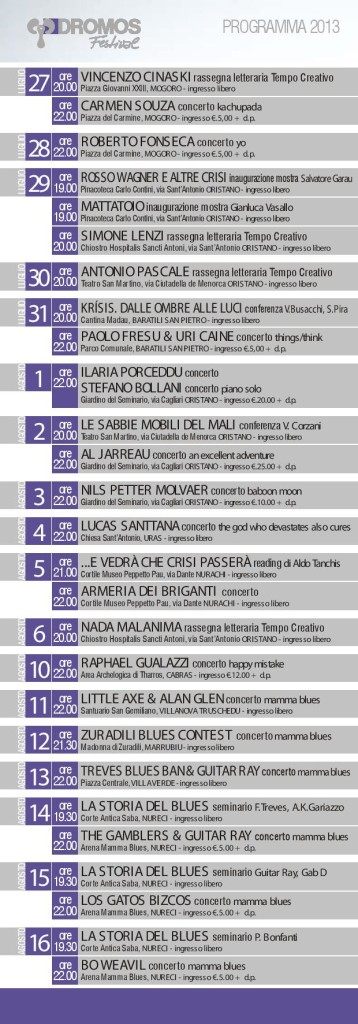15° EDIZIONE DROMOS FESTIVAL – ORISTANO E PROVINCIA – 27 LUGLIO-16 AGOSTO 201315th EDITION DROMOS FESTIVAL – ORISTANO AND OTHER CITY – JULY 27th to AUGUST 16th
 Il Festival Dromos 2013, giunto alla sua XV edizione, si caratterizzerà per la presenza di artisti di livello internazionale e si proporrà, ancora una volta, come un evento territoriale dagli orizzonti geografici e culturali sempre più ampi. A far da sfondo, ma sarebbe più corretto dire, a interagire in un ruolo di comprimari, i più suggestivi spazi urbani e naturali dei comuni di Oristano, di Mogoro, di Baratili San Pietro, di Uras, di Nurachi, di Cabras, di Villanova Truschedu, di Marrubiu, di Villa Verde e di Nureci: un “festival dei territori” ma aperto al mondo. L’edizione di quest’anno avrà per titolo KRÍSIS che, se da un lato fotografa una condizione contemporanea caratterizzante, a livello planetario, equilibri geopolitici e ambiente, economia e finanza, modelli di sviluppo e culture, famiglia, rapporti generazionali e sessualità, dall’altro fa presagire cambiamenti profondi e un futuro non necessariamente negativo, fermo restando che il termine greco Krísis, “la crisi”, è divenuto, oramai, un’imprescindibile categoria di confronto nella quotidianità di ciascuno, capace di condizionarne la percezione della realtà e le aspettative prossime venture. Peraltro, solo una mancanza di prospettiva storica può indurre a pensare che la crisi sia un elemento peculiare del nostro presente o solo di ben definiti e circoscritti momenti storici. Già nel 1966 Frank Kermode, in The Sense of an Ending, un libro divenuto un classico, riteneva «un luogo comune quello di parlare della propria situazione storica come eccezionalmente terribile e, dunque, in un certo modo privilegiata, come se fosse punto cardinale del tempo» e, ancora, «pensiamo che la crisi in cui viviamo sia preminente, più tormentosa, più interessante delle altre crisi». Il critico letterario britannico invitava, dunque, a inquadrarla in un orizzonte più ampio, al fine di poterne mettere in luce tutte quelle potenzialità di sviluppo e di crescita o, per lo meno, di cambiamento, che ogni crisi ha in sé, in un’ottica che contemplasse, insieme, la possibilità di una fine e la prospettiva di un nuovo inizio, un concetto reso magistralmente da T. S. Eliot nell’opera Four Quartets: «nella mia fine è il mio principio». Del resto in tutte le civiltà antiche i temi della ciclicità, della trasformazione, della metamorfosi e, persino, della morte e della conseguente resurrezione, sono elementi fondanti e assolutamente in linea con l’etimologia greca del termine krísis (dal verbo kríno), che rimanda al duplice significato di separazione e scelta/decisione/giudizio. In quest’ottica, che legge la crisi nelle sue potenzialità “positive”, individuandone le pulsioni dinamiche e un’inevitabile tensione al cambiamento, si pone, dunque, la XV edizione del festival Dromos: è la ricerca di quelle «grandi energie spirituali» (Burckhardt) che, in ambito musicale, artistico e letterario e, in prospettiva e forse utopisticamente, nella vita di tutti i giorni, possono innescare quegli agognati processi virtuosi nell’ottica di un nuovo rinascimento.
Il Festival Dromos 2013, giunto alla sua XV edizione, si caratterizzerà per la presenza di artisti di livello internazionale e si proporrà, ancora una volta, come un evento territoriale dagli orizzonti geografici e culturali sempre più ampi. A far da sfondo, ma sarebbe più corretto dire, a interagire in un ruolo di comprimari, i più suggestivi spazi urbani e naturali dei comuni di Oristano, di Mogoro, di Baratili San Pietro, di Uras, di Nurachi, di Cabras, di Villanova Truschedu, di Marrubiu, di Villa Verde e di Nureci: un “festival dei territori” ma aperto al mondo. L’edizione di quest’anno avrà per titolo KRÍSIS che, se da un lato fotografa una condizione contemporanea caratterizzante, a livello planetario, equilibri geopolitici e ambiente, economia e finanza, modelli di sviluppo e culture, famiglia, rapporti generazionali e sessualità, dall’altro fa presagire cambiamenti profondi e un futuro non necessariamente negativo, fermo restando che il termine greco Krísis, “la crisi”, è divenuto, oramai, un’imprescindibile categoria di confronto nella quotidianità di ciascuno, capace di condizionarne la percezione della realtà e le aspettative prossime venture. Peraltro, solo una mancanza di prospettiva storica può indurre a pensare che la crisi sia un elemento peculiare del nostro presente o solo di ben definiti e circoscritti momenti storici. Già nel 1966 Frank Kermode, in The Sense of an Ending, un libro divenuto un classico, riteneva «un luogo comune quello di parlare della propria situazione storica come eccezionalmente terribile e, dunque, in un certo modo privilegiata, come se fosse punto cardinale del tempo» e, ancora, «pensiamo che la crisi in cui viviamo sia preminente, più tormentosa, più interessante delle altre crisi». Il critico letterario britannico invitava, dunque, a inquadrarla in un orizzonte più ampio, al fine di poterne mettere in luce tutte quelle potenzialità di sviluppo e di crescita o, per lo meno, di cambiamento, che ogni crisi ha in sé, in un’ottica che contemplasse, insieme, la possibilità di una fine e la prospettiva di un nuovo inizio, un concetto reso magistralmente da T. S. Eliot nell’opera Four Quartets: «nella mia fine è il mio principio». Del resto in tutte le civiltà antiche i temi della ciclicità, della trasformazione, della metamorfosi e, persino, della morte e della conseguente resurrezione, sono elementi fondanti e assolutamente in linea con l’etimologia greca del termine krísis (dal verbo kríno), che rimanda al duplice significato di separazione e scelta/decisione/giudizio. In quest’ottica, che legge la crisi nelle sue potenzialità “positive”, individuandone le pulsioni dinamiche e un’inevitabile tensione al cambiamento, si pone, dunque, la XV edizione del festival Dromos: è la ricerca di quelle «grandi energie spirituali» (Burckhardt) che, in ambito musicale, artistico e letterario e, in prospettiva e forse utopisticamente, nella vita di tutti i giorni, possono innescare quegli agognati processi virtuosi nell’ottica di un nuovo rinascimento.
TICKET: www.boxofficesardegna.it

 The Festival Dromos, 2013, now in its fifteenth edition, will be characterized by the presence of international artists and propose, once again, as an event by the local geographical and cultural horizons wider and wider. In the background, but it would be more correct to say, to interact in a role of supporting actors, the most beautiful urban spaces and natural municipalities of Oristano, of Mogo, Baratili of St. Peter, Uras, Nurachi, of Cabras, Villanova Truschedu, of Marriottsville, of Villa Verde and Nureci: a “festival of the territories” but open to the world. This year’s edition will be entitled KRISIS that if on one side a picture of a contemporary condition characterizing, at the global level, and geopolitical environment, economy and finance, development models and cultures, family, sexuality and generational relations, from ‘other portends profound changes and a future not necessarily a bad thing, except that the term greek KRISIS, “the crisis” has become, by now, an essential category of comparison in everyday life of each individual, able to influence the perception of reality and expectations next venture. Moreover, only a lack of historical perspective may lead to think that the crisis is a peculiar element of our present or only well-defined and circumscribed historical moments. Already in 1966, Frank Kermode, in The Sense of an Ending, a book that became a classic, considered “a commonplace to speak of his own historical situation as exceptionally terrible and, therefore, in a certain way privileged, as if it was the cardinal point of the time “and again,” we think that the crisis in which we live is paramount, more painful, more interesting than the other crises. ” The British literary critic invited, therefore, to situate it in a wider context, in order to be able to highlight all the potential for development and growth or, at least, of change, that every crisis has in itself, a ‘ Optical contemplating that, together, the possibility of a fine and the prospect of a new beginning, a concept masterfully made by T. S. Eliot’s Four Quartets in the work: “in my end is my beginning.” Moreover, in all the ancient civilizations of the cyclical themes, transformation, metamorphosis, and even of death and consequent resurrection, are the basic elements and absolutely in line with the Greek etymology of the word KRISIS (from the verb krino), which refers to the double meaning of separation and choice / decision / judgment. With this in mind, that reads the crisis in its potential “positive”, identifying the drives dynamic and inevitable tension to change, arises, therefore, the XV edition of the festival Dromos: is the search for the “great spiritual energies” (Burckhardt), which, in music, art and literature and in the future and perhaps utopian, in the life of every day, can trigger those coveted virtuous processes in view of a new renaissance.
The Festival Dromos, 2013, now in its fifteenth edition, will be characterized by the presence of international artists and propose, once again, as an event by the local geographical and cultural horizons wider and wider. In the background, but it would be more correct to say, to interact in a role of supporting actors, the most beautiful urban spaces and natural municipalities of Oristano, of Mogo, Baratili of St. Peter, Uras, Nurachi, of Cabras, Villanova Truschedu, of Marriottsville, of Villa Verde and Nureci: a “festival of the territories” but open to the world. This year’s edition will be entitled KRISIS that if on one side a picture of a contemporary condition characterizing, at the global level, and geopolitical environment, economy and finance, development models and cultures, family, sexuality and generational relations, from ‘other portends profound changes and a future not necessarily a bad thing, except that the term greek KRISIS, “the crisis” has become, by now, an essential category of comparison in everyday life of each individual, able to influence the perception of reality and expectations next venture. Moreover, only a lack of historical perspective may lead to think that the crisis is a peculiar element of our present or only well-defined and circumscribed historical moments. Already in 1966, Frank Kermode, in The Sense of an Ending, a book that became a classic, considered “a commonplace to speak of his own historical situation as exceptionally terrible and, therefore, in a certain way privileged, as if it was the cardinal point of the time “and again,” we think that the crisis in which we live is paramount, more painful, more interesting than the other crises. ” The British literary critic invited, therefore, to situate it in a wider context, in order to be able to highlight all the potential for development and growth or, at least, of change, that every crisis has in itself, a ‘ Optical contemplating that, together, the possibility of a fine and the prospect of a new beginning, a concept masterfully made by T. S. Eliot’s Four Quartets in the work: “in my end is my beginning.” Moreover, in all the ancient civilizations of the cyclical themes, transformation, metamorphosis, and even of death and consequent resurrection, are the basic elements and absolutely in line with the Greek etymology of the word KRISIS (from the verb krino), which refers to the double meaning of separation and choice / decision / judgment. With this in mind, that reads the crisis in its potential “positive”, identifying the drives dynamic and inevitable tension to change, arises, therefore, the XV edition of the festival Dromos: is the search for the “great spiritual energies” (Burckhardt), which, in music, art and literature and in the future and perhaps utopian, in the life of every day, can trigger those coveted virtuous processes in view of a new renaissance.
TICKET: www.boxofficesardegna.it
Leave a Comment
You must be logged in to post a comment.



